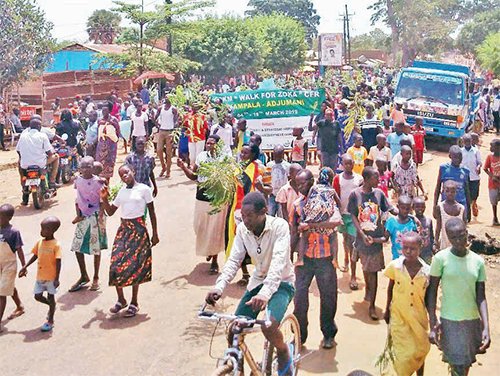Four activists walk for 470km to save Zoka Forest
Uganda Water and Environment week
From March 18 through to 22, Uganda is marking the annual Water and Environment week. As part of activities to mark the Week, New Vision is publishing a series of articles on water and environment as drivers to achieving sustainable development goals to raise awareness on the need to conserve environment resources. In a bid to save Zoka forest, four environmental activists recently walked 470km from Kampala to Adjumani, writes Arnest Tumwesige
They had been in the limelight for their activism in trying to save Zoka Central Forest Reserve in Adjumani district for long. However, they recently took it a notch higher by walking hundreds of kilometres from the environmental ministry headquarters in Kampala to Adjumani in an effort to raise awareness about encroachment on Zoka forest.
Water and environment minister Sam Cheptoris flagged off the group. The walk to Zoka, which took 15 days was undertaken by William Amanzuru Leslie ( the team leader), Solomon Agwe, Geofrey Alule and Ayiga Joseph under their pressure group known as Friends of Zoka. Amanzuru thanked Care International, a nongovernmenatal organisation for supporting their walk.
The group has been raising awareness about the cause since 2016 when the forest came under severe encroachment by loggers, timber dealers and charcoal burning. Amanzuru said unknown people had threatened to harm him and his family if he did not abandon his activities.
Because of the threats, he relocated his family to eastern Uganda for safety. He expressed disappointment in the security forces, saying they let illegal loggers get away with their activities. CLICK HERE FOR MORE ON THIS SUPPLEMENT
City dwellers to continue relying on septic tanks
Residents of greater Kampala will have to wait longer to be connected to a sewer network. According to Dr Silver Mugisha, the managing director of the National water and Sewerage Corporation (NWSC), the population with access to sewer services is expected to increase to 30% after the construction of the sewerage services at Nalukolongo and Kinawataka in the years to come.
Previously, the area covered by the sewer services in Kampala was estimated at 6%. This improved after the construction of the sewerage treatment plant at Lubigi. "One of the biggest concerns is the issue of waste management.
It will take us time to achieve 100% sewerage system because it is expensive," Mugisha said while speaking at the Uganda Water Resources Institute in Entebbe during a panel discussion to mark Uganda Water and Environment Week (UWEWK), organised by the water ministry and its partners.
He added: "the septic tanks will continue to be a stop-gap measure." indicator that if people continue to refill the wetlands and destroy all other surrounding catchments, there will be other natural disasters," he warned. Bwanika suggested that educative exhibitions be set up in areas with the targeted audience in order to achieve the intended goals.
"The essence of the exhibition is to educate society about a national concern which directly affects them. However, the mistake that is always made is organising exhibitions in areas where people already know what is being talked about.
"Most exhibitions target people who already know the impact of their actions — the very people degrading the environment. Back then, the people who degraded the environment were ignorant, but these days, knowledgeable people are the perpetrators, yet they are even more powerful and politically connected," he said. Bwanika said such people know the adverse effects of environmental degradation, but only care about their selfish interests.
"They dump soil in wetlands in order to take free land and release industrial wastes directly into the lake. Some are involved in sand mining. Such people occupy important positions in the country, but do not even bother to show up for the exhibitions," he said Eng. Richard Matua, the commissioner of urban water and sewerage services, observed that both water and the environment are the basic drivers of economic transformation in the country and must be guarded jealously.
"We must be tough on these people because we need water to survive," he said. However, Mugisha pointed out that there is a possibility of environmental pollution from the septic tanks.
"It is expensive to reach everybody with a sewerage system. We are giving people water first," Mugisha said. The discussion was held under the theme, water and environment a strategic driver in the attainment of sustainable development goals (SDGs). CLICK HERE FOR MORE ON THIS SUPPLEMENT
